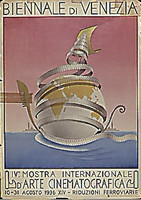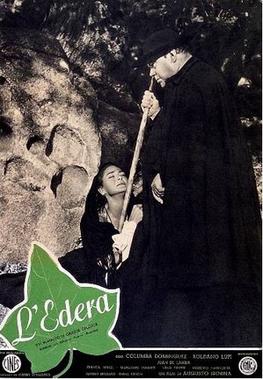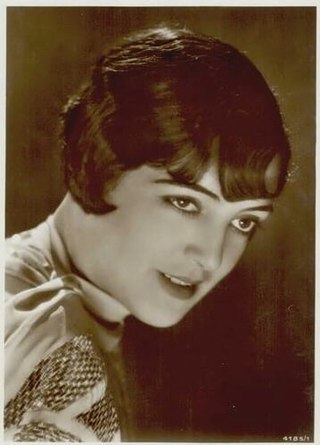Related Research Articles

Little Lord Fauntleroy is a novel by Frances Hodgson Burnett. It was published as a serial in St. Nicholas Magazine from November 1885 to October 1886, then as a book by Scribner's in 1886. The illustrations by Reginald B. Birch set fashion trends and the novel set a precedent in copyright law when Burnett won a lawsuit in 1888 against E. V. Seebohm over the rights to theatrical adaptations of the work.

Augusto Genina was an Italian film pioneer. He was a movie producer and director.

Mario Camerini was an Italian film director and screenwriter.

Lo squadrone bianco is a 1936 Italian film directed by Augusto Genina. The plot features a cavalry lieutenant, unlucky in love, who redeems himself by battling the "rebels" of Tripolitania. The film won the Mussolini Cup at the Venice Film Festival, during the Second Italo-Abyssinian War.

Carmine Gallone was an early Italian film director, screenwriter, and film producer, who was also controversial for his works of pro-Fascist propaganda and historical revisionism. Considered one of Italian cinema's leading early directors, he directed over 120 films in his fifty-year career between 1913 and 1963.
The Prince of the Impossible is a 1918 Italian film directed by Augusto Genina.

Prix de Beauté is a 1930 film directed by Augusto Genina. The film is notable for being the first sound film made by star Louise Brooks, although all of her dialogue and singing were dubbed. This film is an early example of sound film in France, along with L'Age d'Or and Under the Roofs of Paris.

The 4th annual Venice International Film Festival was held between 10 and 31 August 1936. This year saw an international jury nominated for the first time.

Devotion is a 1950 Italian melodrama film directed by Augusto Genina.

Carmen Boni was an Italian actress.

Giuseppa Iolanda Menichelli, known professionally as Pina Menichelli, was an Italian actress. After a career in theatre and a series of small film roles, Menichelli was launched as a film star when Giovanni Pastrone gave her the lead role in The Fire (1916). Over the next nine years, Menichelli made a series of films, often trading on her image as a diva and on her passionate, decadent eroticism. Menichelli became a global star, and one of the most appreciated actresses in Italian cinema, before her retirement in 1924, aged 34.

The 10th annual Venice International Film Festival was held from 11 August to 1 September 1949. The Venice Film Festival came back permanently to the Palazzo del Cinema on the Venice Lido.

Heaven over the Marshes is a 1949 Italian historical melodrama film directed by Augusto Genina and starring Rubi Dalma, Michele Malaspina, Inés Orsini and Domenico Viglione Borghese. The film portrays the life of the saint Maria Goretti. Augusto Genina was awarded the Nastro d'Argento for Best Director for the film. In 2008, the film was included on the Italian Ministry of Cultural Heritage's 100 Italian films to be saved, a list of 100 films that "have changed the collective memory of the country between 1942 and 1978". The film's sets were designed by Virgilio Marchi.

Castles in the Air is a 1939 Italian "white-telephones" comedy film directed by Augusto Genina and starring Lilian Harvey, Vittorio De Sica and Otto Treßler. It was made at Cinecittà in Rome, as part of a co-production with Germany. A separate German-language version was also released. It is based on a novel by Franz Karl Franchy.
Goodbye Youth is a 1927 Italian silent drama film directed by Augusto Genina and starring Walter Slezak, Elena Sangro and Carmen Boni. The film was adapted from the 1911 play of the same name by Nino Oxilia and Sandro Camasio.

Goodbye Youth is a 1918 Italian silent drama film directed by Augusto Genina and starring Maria Jacobini, Lido Manetti and Helena Makowska, The film was adapted from the 1911 play of the same name by Nino Oxilia and Sandro Camasio, The film is set in Turin at the beginning of the twentieth century, where a student begins a romance with a seamstress, Dorina, however he is lured away by a sophisticated older woman to Dorina's distress. Genina remade the film in 1927, again as a silent. It was then remade as a sound film of the same title in 1940.
The Beautiful Wife or Love's Sacrifice is a 1924 Italian silent film directed by Augusto Genina and starring Carmen Boni.
The Hearth Turned Off is a 1925 Italian silent film directed by Augusto Genina and starring Carmen Boni.

The Woman Dressed As a Man is a 1932 French comedy film directed by Augusto Genina and starring Carmen Boni, Armand Bernard and André Dubosc.

Cyrano de Bergerac is a Franco-Italian silent romantic drama film directed by Augusto Genina in 1922 based on the 1897 play of the same name by Edmond Rostand. Genina began filming in 1922, at age 30, with the help of his cousin Mario Camerini, but its release was delayed by the colorization of the film.
References
- ↑ Stewart p.52